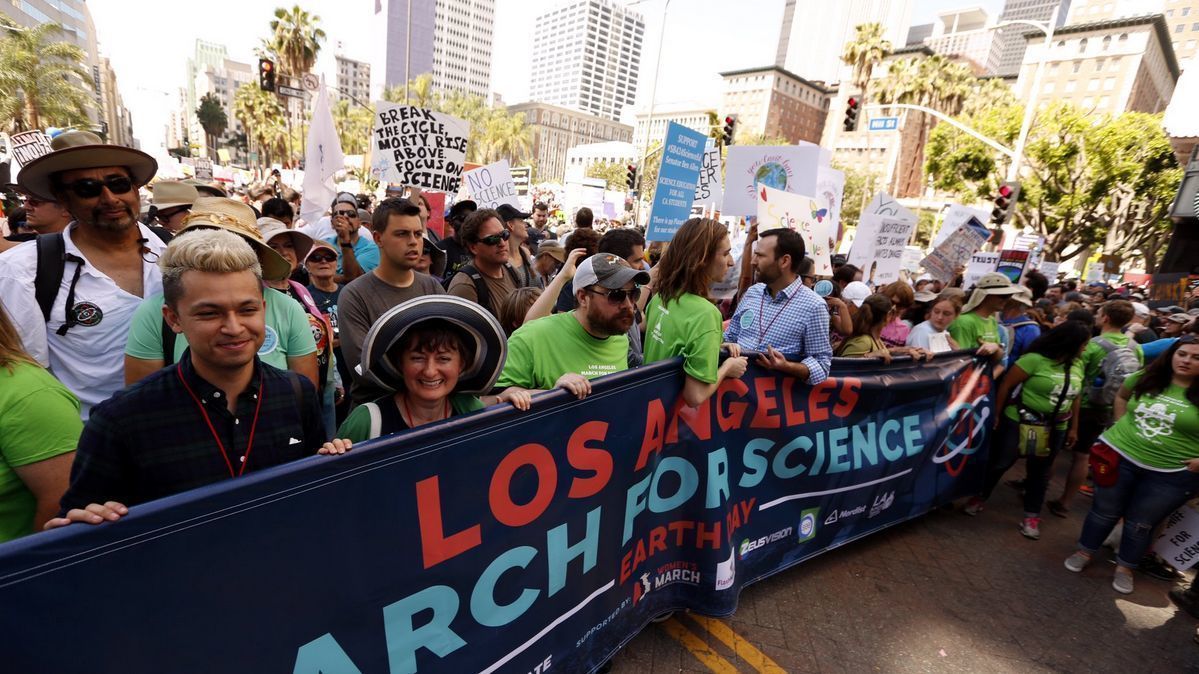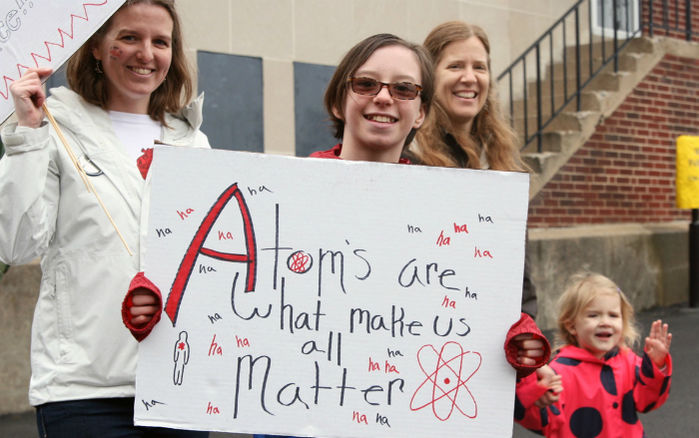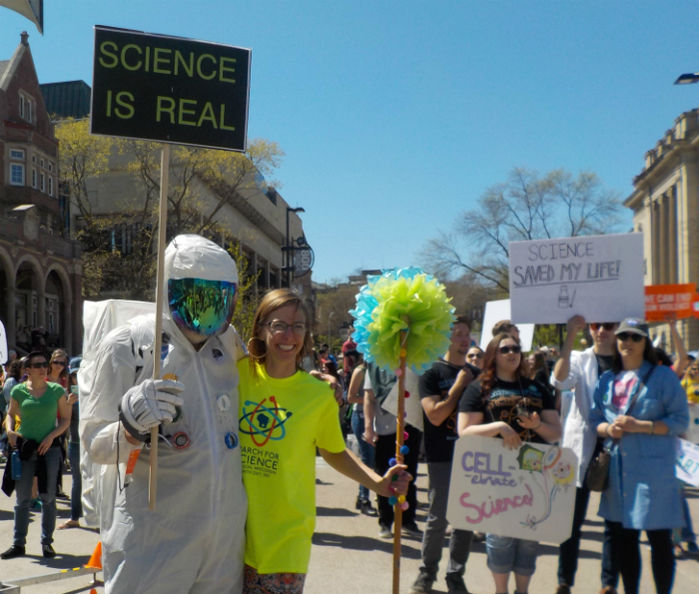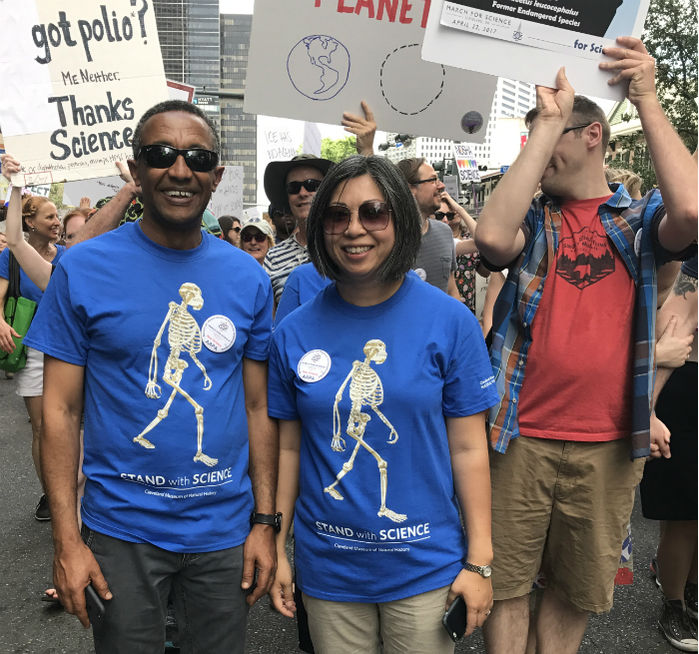MEXICO CITY: Budget Cuts, Corruption Motivate Marchers
The march here had a strong unifying theme: Opposition to recent cuts to the National Council of Science and Technology (Conacyt) and the grants to graduate students it provides. Hundreds of people marched from the Angel of Independence to the Zocalo this afternoon, chanting "More scientists, fewer politicians" and "Grants yes, cuts no."
"They ask us for excellence, but they give us miserable resources," said Guadalupe Barrera, a researcher at the Metropolitan Autonomous University (UAM), who marched with students from her ecotoxicology lab. "Students are the most vital part of the scientific community."
Anti-Trump signs were scarce, but many marchers expressed dismay about the case of Javier Duarte, the ex-governor of Veracruz who absconded with state funds and was recently arrested in Guatemala. The money that Duarte took could have funded 60,000 doctoral grants, nearly the number of all graduate grants Conacyt currently gives, said Edith Marcial Juárez, a doctoral student at the research center Cinvestav. "It’s disillusioning."
Many marchers hoped the demonstration would cause Conacyt to reconsider a change in how grants were calculated, which many here say will make it impossible for them to keep up with inflation. "We can't work. We have to live off our grants," said Leonardo Salas Domínguez, a student at the UAM. He brought his young daughter, whom he supports with his Conacyt grant, which is about $1500 a month. "It's complete idiocy to cut education and not the salaries of politicians," he said. –Lizzie Wade
TROMSØ, NORWAY: An Upbeat March in Norway, Despite Fears of Melting Ice
Despite the "notoriously reserved nature of Norwegians," Adele Williamson was pleased to tell ScienceInsider that the march in Tromsø, Norway, attracted about 200 people. No doubt the marchers were equally happy to have a beautiful day, not a sure bet 300 km north of the Arctic circle. "The atmosphere was so energetic and quite outspoken," says Williamson, a biochemist at the University of Tromsø, and an organizer of the march. "We have just come from the cold dark (polar night) winter just over a month ago, so the risk with beautiful weather is that many would rather go skiing in the sunshine."
But a crowd assembled and marched, accompanied by the town's well-known student marching band Ompagniet. One of the locally relevant signs said ‘Isen Har Ikke Agenda, Den Bare Smelter!’ (Ice Has No Agenda-It Just Melts). At the market square, people listened to speeches from local politicians and research leaders, including the director of the Norwegian Polar Institute, Jan-Gunnar Winther, who said he would have died of cancer, had it not been for scientific research. After the march, discussions about science attracted "many non-research participants, some of whom joined spontaneously," Williamson says. –Erik Stokstad
SAN FRANCISCO, CALIFORNIA: Living with HIV, and Marching for Science
San Francisco's Justin Herman Plaza was full as the premarch rally begins. City supervisor Jeff Sheehy was one of three politicians who opened the rally with stories of why they're marching. "I turned 60 yesterday," he said, eliciting cheers and well wishes from the crowd. "Hold on," he continued. "I've been living with HIV for 20 years. Without science, I would be dead." He finished by leading the crowd in a boisterous call and response inspired by an LGBT activist chant: "Facts and evidence under attack," "Act up, fight back!" "Public health under attack," "Act up, fight back!" "Our children's and grandchildren's future under attack," "Act up, fight back!" –Rachel Bernstein
NEW ORLEANS, LOUISIANA: Turns out, Standing Out was Easy in The Big Easy
In New Orleans there are parades in the French Quarter every day, so the anthropologists here for the annual meeting of the American Association of Physical Anthropologists hired a New Orleans band and passed out Mardi Gras beads to keep up with the locals. There was no need to worry, however, because the sight of some 5000 scientists (1400 anthropologists) marching in lab coats and Einstein wigs with placards seeking money for science, of all things, was a novelty. Local people lined up on Canal Street to watch the scientists, who chanted:
"What do you want?"
"Funding!"
"When do you want it?"
"Now."
The marchers, who came from all over the world, carried placards that had a distinct paleo theme: "A world without science is not humerus," declaimed one. Another: "Walking upright for science." –Ann Gibbons
MORGANTOWN, WEST VIRGINIA: In Appalachia, Caution on Making Science Political
Under a gray sky, several hundred students, scientists, and children listened to speakers—including environmental consultant and clean water advocate Evan Hansen—extol science’s role in keeping West Virginia’s waters clean and protecting future generations. Much of the crowd, which march organizers estimated at 500, was made up of families with young children, who took part in a premarch festival including displays from West Virginia University’s science departments. There were also live owls and falcons from the Avian Conservation Center of Appalachia.
Fewer undergraduate students were on hand, in part because organizers didn’t want to “impose this on students,” says Penny Dacks, a neuroscientist with the American Epilepsy Society who helped run the march. “There is a fear that this will be misunderstood as [partisan and political]. Science should not be political,” she says. “Science shouldn’t tell us what to do, but it’s a very powerful tool. It’s a screwdriver and anyone should be able to use it.”
In the crowd were Helen Robertson-Honecker (center, below) and her mother, Jen (left). Why? “Because science is awesome,” says Helen. –Catherine Matacic
CLEVELAND, OHIO: Sorry, Son, We Had to March
Biologist Andrea Case of Kent State University ditched her son’s piano recital to drive an hour to her first march ever. “I want to put myself out there as one of many scientists who want to communicate more with the public,” she said. “And policies should be based on facts if we expect them to work.” Her husband, biologist Pat Lorch, who also ditched the recital, added that he wanted to “push back on the idea that science is not important to society. ” That was a clear theme in Cleveland, where dozens of institutions from all areas of life helped sponsor the event, from the Rock and Roll Hall of Fame to the Museum of Contemporary Art to the Portside Distillery. (And like Calagary's marchers, Ohioans love brewer's yeast apparently.) –Elizabeth Culotta
CALGARY, CANADA: "Clearly, Something is Missing"
Marchers in the heart of the Canadian oil patch came out by the hundreds on a sunny afternoon. It was as much a march for democracy and diversity, starting at the statue of the Women are Persons! Monument in the city's Olympic Plaza and ending at the plaza in front of the Calgary Municipal Building.
Speeches came from a variety of speakers, including a science broadcaster and writer, a Pakistani-born Canadian Muslim who works in STEM, a Pakistani-born professor who studies cell biology and anatomy; and, an emergency room physician who helped start the process to phase out coal-fueled power plants by 2030 in Alberta.
Jay Ingram, the former broadcaster who most recently wrote The Science of Why, said there shouldn't even be a need to have a March for Science. "Clearly something is missing—and the people here, and I, agree that science is important and that governments should recognize that," he said, "but clearly we haven't done a good job at communicating that. "So, I am hoping this is not just an event for today, but a beginning," he added.
The event also featured an activist singing group, The Raging Grannies, who sang about global warming to the tune of Glory, Glory Hallelujah. “Our emissions are surely harming,” they sang, “but Donald’s head is in the sand.” –Colette Derworiz
MADISON, WISCONSIN: In the Badger State, Getting Their Science On
Led by a marching band, a crowd that ranged from 2000 to 4000 marched from James Madison Park on the shores of Lake Mendota—one of the most studied lakes in the world—to Library Mall on the University of Wisconsin (UW) campus. Early in the day, arriving marchers were asked whether they were up for “getting their science on.” One space-suited marcher (below) sweated for science. Later, UW carbohydrate biochemist Laura L. Kiessling told the all-ages assemblage of researchers, teachers, students, health care workers, families, and science allies that "you right now are making vitamin D." And they cheered when she said, "Give us evidence-based policy. We need to demand that." –Christine Mlot
URCUQUI, ECUADOR: A Small but Determined South American March
Geologist Paul Baker, who is working in Ecuador at Yachay Tech University, emailed our Mexico City correspondent Lizzie Wade about one of the smaller marches today: “The March was great. We had probably 250 people, so perhaps a quarter of all of our students at the university. We gathered on campus and then walked the 3 km uphill to the plaza of Urcuqui. We even had an angry man pull his truck in front of us, blocking the way, but we just walked around and kept going. There were few people along the way, because we are in a very small community, but we think it was important for the community to see us and to hear from us about what we do at Yachay Tech and what motivates our students. On the plaza, the mayor spoke briefly as did various students from Yachay. Local high school students also attended (perhaps, 60 or so), [and] a couple random people from Urcuqui spoke…I think it was the only March for Science in Ecuador."
3 WAYS TO SHOW YOUR SUPPORT
- Log in to post comments


















